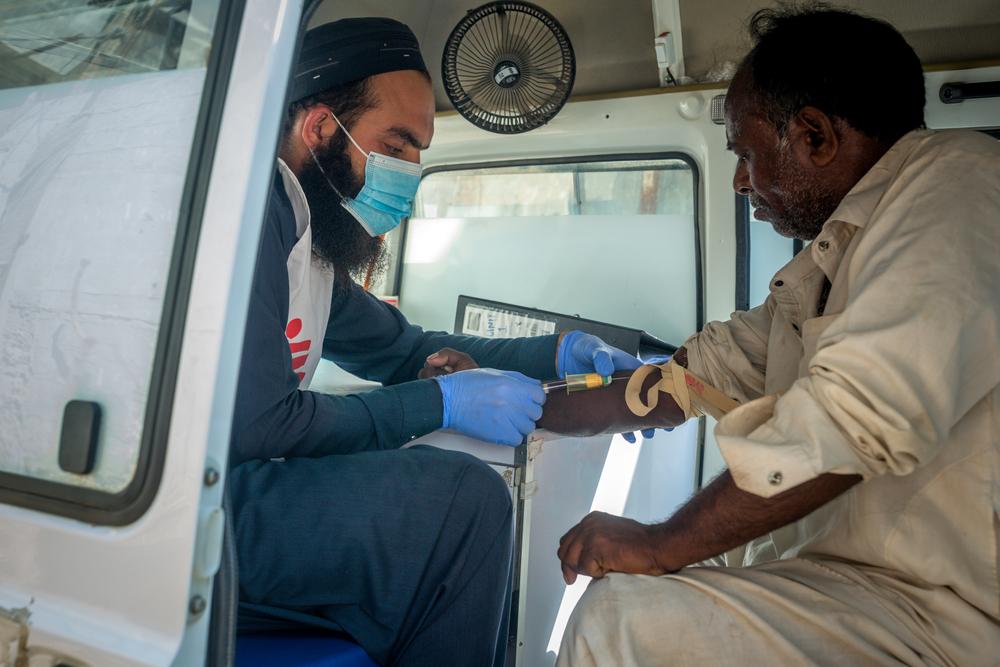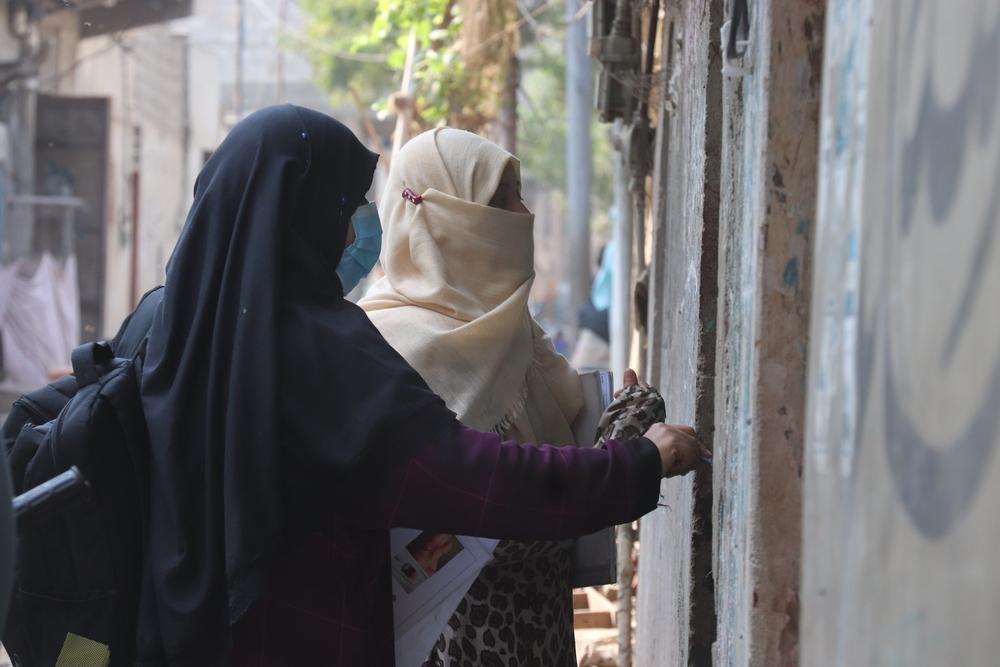Pakistan: Turning the tide of hepatitis C treatment in Machar Colony

Overcrowded housing in the informal settlement of Machar Colony in Karachi. Pakistan, April 2024. © Asim Hafeez
In southern Pakistan's Sindh Province, on the edge of Karachi's bustling fish harbour, sits Machar Colony, an informal settlement where life is harsh, often unkind, and plagued by overcrowding, poor sanitation, and limited access to basic services. The community's struggles with health and well-being have long been exacerbated by these conditions, leaving residents vulnerable to a range of medical issues.
Doctors Without Borders / Médecins Sans Frontières (MSF) had been providing essential healthcare services in Machar Colony since 2012, offering emergency services, maternal health, and general health consultations. However, as the years progressed, Doctors Without Borders' team noticed troubling patterns at their primary health clinic.
"Many residents started coming in with symptoms such as body aches, fatigue, decreased appetite, fever, or sometimes infection signs that hinted at a serious health issue," says Dr Khawar Aslam, the Project's Medical Lead, who has been working with the team since 2014.
"As we investigated further, we found that a significant number of these cases were related to hepatitis C, a viral infection that affects the liver and can lead to severe health complications. Notably, during that time, Pakistan had the second-highest hepatitis C disease burden globally and had already initiated its national hepatitis control programme in 2005," Dr Aslam continues.

A skilled lab technician carefully sets up a cartridge for accurate hepatitis C testing with the GeneXpert® at the Doctors Without Borders clinic in Machar Colony, Karachi. Pakistan, April 2024. © Asim Hafeez
Hepatitis C transmission in Pakistan is largely driven by inadequate sterilization of medical equipment and the improper reuse of needles and syringes. Contaminated blood transfusions also pose a significant risk. Common practices like barbering, tattooing, and piercing are contributing to the spread of the virus, as equipment is often not properly sterilized. In addition to these factors, the growing issue of intravenous drug use is also fuelling the transmission of Hepatitis C in Pakistan.
According to the World Health Organization (WHO), as of April 2024, Pakistan has the highest number of viral hepatitis C infections in the world, with around 8.8 million cases, accounting for 44 per cent of all new hepatitis C infections attributed to unsafe medical injections. Commonly, people are screened for hepatitis C only when they start showing signs of liver disease, which is often too late. If left untreated for too long, hepatitis C can progress to severe liver disease and even liver cancer.
Many people in Machar Colony were unaware that they were infected because the virus can remain dormant for years without showing symptoms. Even those who recognised their condition, either elsewhere or at our clinic, often faced obstacles to treatment, including high costs and the challenge of travelling to distant hospitals. Residents have limited income sources, primarily relying on fishing, daily wage work, or small-scale businesses, which barely cover their daily needs. Additionally, upon referrals to other hospitals, identity cards were required for hepatitis C care; however, most of the community in Machar Colony was undocumented, so they were refused treatment.Dr. Khawar Aslam, Project Medical Lead
Recognising the urgent need for action, in 2015 Doctors Without Borders started a comprehensive programme to provide free testing and treatment directly to residents. The hepatitis C services were integrated into the existing primary healthcare facility, allowing Doctors Without Borders to reach people who would otherwise remain unaware of their condition. In 2018, Doctors Without Borders closed its primary healthcare services and shifted its focus solely to the treatment of hepatitis C patients.
"My wife was diagnosed with hepatitis C about a year ago and received successful treatment at the Doctors Without Borders clinic in Machar Colony. When I subsequently developed symptoms such as leg and back pain, as well as weakness, I sought medical attention and was referred to the Doctors Without Borders clinic,” says Javeed Ali, one of the Doctors Without Borders' programme's patients.
“Inspired by my wife's positive experience, I underwent testing and was diagnosed with hepatitis C. I then completed a three-month treatment course, and fortunately, my follow-up test results were negative. My wife and I are both now in good health."

A Doctors Without Borders nurse, collects a blood sample from a patient during an outreach activity in a neighbourhood of Machar Colony in Karachi. Pakistan, April 2024. © Asim Hafeez
To effectively address the crisis, Doctors Without Borders implemented a proactive strategy focused on community engagement. In a primary healthcare setup, free-of-charge hepatitis C services including screening, diagnosis, treatment, health education, and patient support were provided under one roof.
Between 2022 and 2024, Doctors Without Borders teams conducted widespread testing, going door-to-door and using mobile vans to offer in-home testing for residents aged 12 and older. This approach, named “bending the curve,” ensured that no one was overlooked and that those who tested positive were quickly referred for treatment, helping to bend the curve of hepatitis C in the community.
“By offering free services in one location, we made it easier for people to access care. Our goal was to reduce infections and stop the disease from spreading. We’ve reached nearly 100 per cent of the community, spreading awareness and facilitating immediate treatment for those in need,” Dr Khawar Aslam explains.
Doctors Without Borders also collaborated with the Ministry of Health to bring hepatitis C care closer to the community by establishing a treatment facility in August 2022 at the Baldia town Rural Health Centre, Kemari district, Karachi. In this initiative, patients referred from Baldia hospitals' outpatient departments and those identified by community health workers were screened for hepatitis C. The community health workers were trained to educate the community about hepatitis C risk factors and prevention.

A team of Doctors Without Borders community health workers during an outreach activity in a neighborhood of Machar Colony, Karachi. They are going door-to-door to ensure that people who are vulnerable to hepatitis C visit the Doctors Without Borders facility for testing and treatment. Pakistan, November 2023. © Farah Tanjee/MSF
Patients diagnosed with chronic hepatitis C received treatment for 12 or 24 weeks, depending on the severity of their liver disease. Additionally, all patients were offered hepatitis B vaccination to prevent future infections. This centre, handed over to the Ministry of Health in August 2023, serves as a crucial hub for hepatitis C treatment in the region. It is equipped with modern diagnostic tools and is now recognised as a key site for hepatitis care in Sindh.
In addition to reducing hepatitis C, Doctors Without Borders also played a vital role in Machar Colony during the COVID-19 pandemic. Doctors Without Borders supported vaccination efforts in Machar Colony and surrounding areas, ensuring residents received vital information about COVID-19 symptoms, prevention, and vaccination. V teams also distributed reusable masks and soap to help the community stay safe during the pandemic.
As Doctors Without Borders hepatitis C programme concludes, the results are clear: thousands of lives have been transformed, and the rate of new infections has significantly declined. While hepatitis C remains a challenge in Machar Colony, the alarming spread has been curtailed, thanks to widespread awareness and early detection.
Doctors Without Borders has achieved its target of mobilising nearly 100 per cent of the community for hepatitis C awareness, and screening more than 72 per cent of residents. Between 2015 and 2024, Doctors Without Borders screened over 129,922 individuals in its clinic and in the community, undertook 64,984 consultations for hepatitis C at the Doctors Without Borders clinic, performed 25,553 diagnostic polymerase chain reaction (PCR) tests, and provided treatment to over 9,398 patients. Among them, 6,909 completed their treatment. Of the remaining people, 2,061 were lost to follow-up without completing treatment, 176 with completed treatment were lost to follow-up, 14 people died during this period, while for the remaining 50 people, either treatment was not completed or follow-up stopped. Of the 6,909 completed treatments, 6,755 got cured of hepatitis C, which is 93.3 per cent, while the remaining 459 failed treatment, which makes 6.3 percent. The success of Doctors Without Borders' treatment initiatives will serve as a model for similar programmes in other underserved communities across Pakistan.
Doctors Without Borders first began working in Pakistan in 1986 and currently provides a range of health services across all four provinces of the country, including maternal and child healthcare, primary healthcare, treatment for cutaneous leishmaniasis (CL), drug-resistant tuberculosis (DR-TB), and ongoing emergency responses.